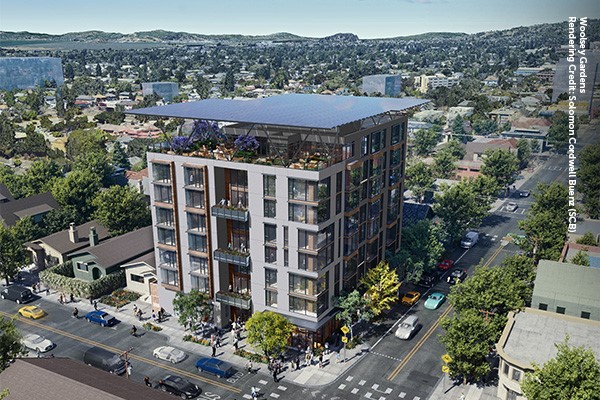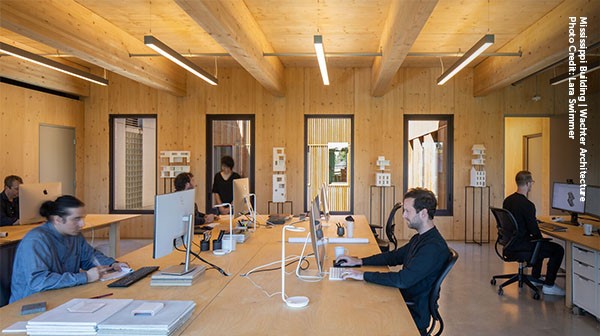Funded Research Expands Opportunities for Softwood Lumber
The SLB invests in research in areas that stand to have the most direct benefits for the softwood lumber industry. The goal of these investments is to fuel innovation and to increase consumption of softwood lumber products. Expansion into new and emerging markets, including mid-rise and tall buildings, will result in greater demand and increased value for softwood lumber products.
The SLB has funded applied research as part of its broader softwood lumber promotion program since July 2012 and as a key means to multiply overall return on investment to the industry. To date, the SLB has delivered tremendous impact in developing and using research to address market barriers, increase awareness of the benefits of softwood lumber among building professionals, and, most importantly, increase the consumption of softwood lumber.
Organizations may submit project proposals to the SLB at any time. Please review our evaluation criteria and guidelines prior to submission.
To learn more about perennial funding opportunities such as the Mass Timber Competition or matching funds for the Wood Innovations Grant, please read on.
Mass Timber Competition: Building to Net-Zero
The SLB and USDA Forest Service jointly funded the 2022 and 2023 Mass Timber Competition: Building to Net-Zero Carbon. The competition was designed to expand the use of mass timber in the United States and showcase mass timber’s application, practicality, commercial viability, and role as a natural climate solution that reduces the carbon footprint of the built environment. The competition is intended to help expand the use of mass timber building solutions and support increased employment in advanced wood products design, engineering, construction, supply chain, and manufacturing sectors.
In October 2023, the SLB and USDA Forest Service announced five winning projects to receive funds totaling $2.2 million to demonstrate mass timber’s applications in architectural design and highlight its significant role in reducing the carbon footprint of the built environment.
- CODA, a mixed-use residential project in Detroit—its team includes OOMBRA Architects, Brush Park Properties, IN Development Partners, JDH Engineering, Britt Peters and Associates, and AM Higley.
- Up@310 Lofts, a vertical addition to an existing building, from the Lignin Group, Tim Olson, Banwell Architects, 310 Marlboro St., and Entuitive.
- Via/NWA IC Program, an affordable housing project spearheaded by Blue Crane with a design team that includes A226, Modus Studio, Tatum-Smith-Welcher, Aspect Structural Engineers, and Arco Construction.
- The Village SF Wellness Center, a mixed-use social support complex for The Friendship House Association of American Indians; its project team includes PYATOK architecture + urban design, DCI Engineers, and Cahill Contractors.
- Woolsey Gardens, a high-rise multifamily project, with a team that includes Solomon Cordwell Buenz, Northern California Land Trust, Tipping Structural Engineers, Swinerton Builders, and Timberlab.

Rendering of 2023 Mass Timber Competition project Woolsey Gardens, to be built in California
Follow the status of the 2022 and 2023 winning projects on the Mass Timber Competition page.
The entry period for the 2025 Mass Timber Competition: Building Sustainable Schools opened on October 28, 2024. This year’s competition will award funds totaling $1.8 million to support projects that accelerate the pace of mass timber adoption in the United States, specifically in the K-12 learning environment. The entry period closed on Monday, January 13, 2025. To learn more, visit the Mass Timber Competition page.
Wood Innovations Grant Projects
Several projects funded in previous years by USDA Forest Service Wood Innovations Grants and supported by matching funds from the SLB have made significant progress—opening up new market opportunities for the softwood lumber industry. Updates include:
- The SLB is supporting architecture, engineering, fire safety, building code, sustainability, and preconstruction-cost analyses for two mass timber high-rise residential developments from The Neutral Project, including a 14-story wood development in Madison, Wisconsin, dubbed Baker’s Place. Madison-based Angus-Young Associates is the architect and structural engineer for the mixed-use development, and Michael Green Architecture is the project designer.
- Another one-of-a-kind project to receive funding was an all-wood, three-story building in Portland, Oregon, designed by Waechter Architecture, demonstrating just how much of a building can be constructed using exposed timber components (pictured below).

- Blast testing research conducted by science and engineering consulting firm Karagozian & Case is being funded to investigate whether reinforced CLT can meet Department of State protective design requirements cost-effectively. It’s expected this research will be able to show how mass timber can be used to build blast-resistant structures, opening new markets for building types such as courthouses, embassies, federal facilities, and emergency call centers.
- The structural engineering firm Equilibrium has launched a suite of CLT design tools. These interactive spreadsheets helps engineers design CLT floors, roofs, and walls to meet the latest building codes and standards with greater speed and accuracy.
The SLB will continue to share the outcomes and lessons generated by these groundbreaking projects as part of an overall effort to promote the benefits and uses of softwood lumber in residential and commercial construction.
Expanding Markets with Accelerator Cities Programs

The Bunker Hill Housing Redevelopment, which was awarded a grant through the Boston Mass Timber Accelerator program, includes a six-story affordable housing project built with a CLT floor and roof system and a nine-story mass timber and steel hybrid building.
The SLB is supporting several accelerator cities programs, working with jurisdictions, industry, and local governments to expand opportunities for lumber-based building systems while removing barriers and streamlining code compliance.
The accelerator projects in Atlanta and New York City use matching funds from the USDA Forest Service’s Wood Innovations Grants and other organizations, leveraging the impact of the SLB’s $50,000 investment in the $500,000 overall project. The two accelerators join Boston’s Mass Timber Accelerator Program, which launched in fall 2021 with funding from the SLB, the Forest Service, and the ClimateWorks Foundation.
- Managed by the Boston Planning & Development Agency, the Boston Mass Timber Accelerator Program announced three development projects for a second round of funding in 2023. The program, which first launched in 2021, issued a report finding that eight active projects totaling over 1.3 million SF were projected to be constructed with mass timber materials as well as 22 future projects totaling over 4.3 million SF.
- Led by the New York City Economic Development Corporation (NYCEDC), the NYC Mass Timber Studio is helping to increase the use of mass timber in New York City. The Studio selected seven winners for the inaugural cohort of participants and a second cohort has been selected.
- In 2024, the Atlanta Mass Timber Accelerator Program from the Georgia Forestry Foundation (GFF), in partnership with the City of Atlanta, announced three selected projects. Now renamed the Georgia Mass Timber Accelerator, the program has grown to establish five mass timber hubs in several metros across Georgia.
The SLB is inviting cities interested in building more non-residential and multifamily structures with wood to apply for funding and project support for their own accelerator programs. Cities ready to join the ranks of municipal innovation leaders should act quickly. For application guidance and to discuss your city’s potential for selection, contact us immediately at acceleratorcities@softwoodlumberboard.org.

